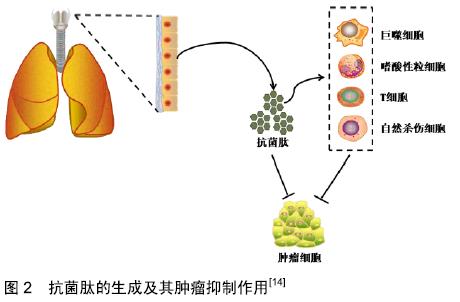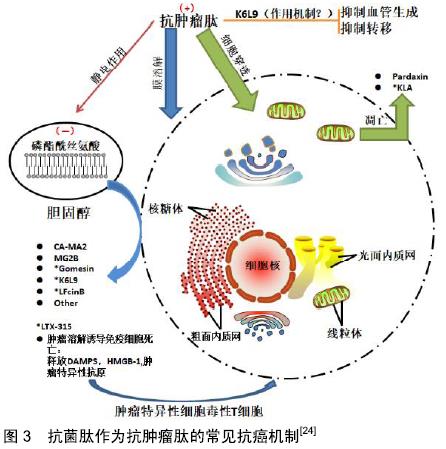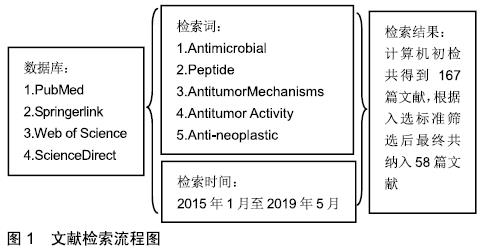[1] TANISHIKI N, YANO Y, MATSUZAKI K. Endowment of pH responsivity to anticancer peptides by introducing 2,3-diaminopropionic acid residues. Chembiochem. 2019; 20(16):2109-2117.
[2] GHOSH SK, MCCORNICK TS, WEINBERG A. Human Beta Defensins and Cancer: Contradictions and Common Ground. Front Oncol. 2019; 3(9):341-348.
[3] DASKIVICH TJ. Life Expectancy and Treatment Choice for Men with High-risk Prostate Cancer. Eur Urol. 2015; 68(1):59-60.
[4] BOWER H, BJORKHOLM M, DICKMAN PW, et al. Life Expectancy of Patients With Chronic Myeloid Leukemia Approaches the Life Expectancy of the General Population. J Clin Oncol. 2016; 34(24):2851-2857.
[5] LIN J, XIA L, LIANG J, et al. The roles of glucose metabolic reprogramming in chemo- and radio-resistance. J Exp Clin Cancer Res. 2019;38(1):218-230.
[6] DUTTA P, DAS S.Mammalian Antimicrobial Peptides: Promising Therapeutic Targets Against Infection and Chronic Inflammation. Curr Top Med Chem. 2016;16(1):99-129.
[7] HIEMSTRA PS, AMATNGALIM GD, VAN DER DOES AM, et al. Antimicrobial Peptides and Innate Lung Defenses: Role in Infectious and Noninfectious Lung Diseases and Therapeutic Applications.Chest. 2016;149(2):545-551.
[8] AGEITOS JM, SANCHEZ-PEREZ A, CALO-MATA P, et al. Antimicrobial peptides (AMPs): Ancient compounds that represent novel weapons in the fight against bacteria. Biochem Pharmacol. 2017;1(133):117-138.
[9] KUMAR P, KIZHAKKEDATHU JN, STRAUS SK. Antimicrobial Peptides: Diversity, Mechanism of Action and Strategies to Improve the Activity and Biocompatibility In Vivo. Biomolecules.2018;8(1):4-27.
[10] MORAVEJ H, MORAVEJ Z, YAZDANPARAST M, et al. Antimicrobial Peptides: Features, Action, and Their Resistance Mechanisms in Bacteria. Microb Drug Resist. 2018;24(6):747-767.
[11] PIRTSKHALAVA M,GABRIELIAN A,CRUZ P, et al. DBAASP v.2: an enhanced database of structure and antimicrobial/cytotoxic activity of natural and synthetic peptides. Nucleic Acids Res. 2016;44(13):6503-6507.
[12] HASAN M, MOGHAL MMR, SAHA SK, et al.The role of membrane tension in the action of antimicrobial peptides and cell-penetrating peptides in biomembranes. Biophys Rev. 2019;11(3):431-448.
[13] HASAN M, YAMAZAKI M.Elementary Processes and Mechanisms of Interactions of Antimicrobial Peptides with Membranes-Single Giant Unilamellar Vesicle Studies. Adv Exp Med Biol. 2019;1117(2):17-32.
[14] ROUDI R, SYN NL, ROUDBARY M. Antimicrobial Peptides As Biologic and Immunotherapeutic Agents against Cancer: A Comprehensive Overview. Front Immunol. 2017; 13(8): 1320-1329.
[15] SIKANDAR A, KOEHNKE J.The role of protein-protein interactions in the biosynthesis of ribosomally synthesized and post-translationally modified peptides. Nat Prod Rep. 2019;28. doi: 10.1039/c8np00064f. [Epub ahead of print].
[16] CHUNG CR, KUO TR, WU LC, et al. Characterization and identification of antimicrobial peptides with different functional activities. Brief Bioinform. 2019; pii: bbz043. doi: 10.1093/bib/bbz043. [Epub ahead of print]
[17] SHER KHAN R, IQBAL A, MALAH R, et al. Plant defensins: types, mechanism of action and prospects of genetic engineering for enhanced disease resistance in plants. 3 Biotech 2019;9(5):192-218.
[18] JI P, ZHOU Y, YANG Y, et al.Myeloid cell-derived LL-37 promotes lung cancer growth by activating Wnt/beta-catenin signaling. Theranostics. 2019;9(8):2209-2223.
[19] HOLLY MK, DIAZ K, SMITH JG.Defensins in Viral Infection and Pathogenesis. Annual review of virology. 2017;4(1): 369-91.
[20] AIDOUKOVITCH A, ANDERS E, DAHL S, et al. The host defense peptide LL-37 is internalized by human periodontal ligament cells and prevents LPS-induced MCP-1 production.J Periodontal Res.2019;28.doi: 10.1111/jre.12667. [Epub ahead of print].
[21] HASHEMI MM, HOLDEN BS, COBURN J, et al. Proteomic Analysis of Resistance of Gram-Negative Bacteria to Chlorhexidine and Impacts on Susceptibility to Colistin, Antimicrobial Peptides, and Ceragenins. Front Microbiol. 2019;10(18):210-222.
[22] HU WW, HUANG SC, JIN SC. A novel antimicrobial peptide-derived vehicle for oligodeoxynucleotide delivery to inhibit TNF-alpha expression. Int J Pharm. 2019;10(558): 63-71.
[23] HOLLMANN A, MARTINEZ M, NOGUERA ME, et al. Role of amphipathicity and hydrophobicity in the balance between hemolysis and peptide-membrane interactions of three related antimicrobial peptides. Colloids Surf B Biointerfaces. 2016;1(141):528-536.
[24] DESLOUCHES B, DI YP. Antimicrobial peptides with selective antitumor mechanisms: prospect for anticancer applications. Oncotarget. 2017;8(28):46635-46651.
[25] BEVERS EM, WILLIAMSON PL. Getting to the Outer Leaflet: Physiology of Phosphatidylserine Exposure at the Plasma Membrane. Physiol Rev. 2016;96(2):605-645.
[26] OLIVEIRA-FERRER L, LEGLER K, MILDE-LANGOSCH K. Role of protein glycosylation in cancer metastasis. Semin Cancer Biol. 2017;8(44):141-152.
[27] DIMITRAKOPOULOS FD, KOTTOROU AE, ANTONACOPOULOU AG, et al.Expression of Immune System-Related Membrane Receptors CD40, RANK, BAFFR and LTbetaR is Associated with Clinical Outcome of Operated Non-Small-Cell Lung Cancer Patients. J Clin Med. 2019; 8(5): 741-758.
[28] LI X, SHEN B, CHEN Q, et al. Antitumor effects of cecropin B-LHRH' on drug-resistant ovarian and endometrial cancer cells. BMC Cancer. 2016;3(16):251-259.
[29] GUZMAN-RODRIGUEZ JJ, OCHOA-ZARZOSA A, LOPEZ-GOMEZ R, et al. Plant antimicrobial peptides as potential anticancer agents. Biomed Res Int. 2015;2015: 735087-735097.
[30] TIAN L, ZHANG D, SU P, et al. Design, recombinant expression, and antibacterial activity of a novel hybrid magainin-thanatin antimicrobial peptide. Prep Biochem Biotechnol. 2019;49(5):427-434.
[31] HANET EF, STRAUS SK, HANCOCK REW. Reassessing the Host Defense Peptide Landscape. Front Chem. 2019;7(1): 43-64.
[32] THEANSUNGNOEN T, MAIJAROEN S, JANGPROMMA N, et al. Cationic Antimicrobial Peptides Derived from Crocodylus siamensis Leukocyte Extract, Revealing Anticancer Activity and Apoptotic Induction on Human Cervical Cancer Cells. Protein J. 2016;35(3):202-211.
[33] HAN Y, CUI Z, LI YH, et al. In Vitro and in Vivo Anticancer Activity of Pardaxin against Proliferation and Growth of Oral Squamous Cell Carcinoma. Mar Drugs. 2015;14(1):2-13.
[34] CAMILIO KA, WANG MY, MAUSETH B, et al. Combining the oncolytic peptide LTX-315 with doxorubicin demonstrates therapeutic potential in a triple-negative breast cancer model. Breast Cancer Res. 2019;21(1):9-20.
[35] ZHOU H, FORVEILLE S, SAUVAT A, et al. The oncolytic peptide LTX-315 triggers immunogenic cell death. Cell Death Dis. 2016;10(7):e2134-e2144.
[36] URAKI S, SUGIMOTO K, SHIRAKI, et al.Corrigendum: Human beta-defensin-3 inhibits migration of colon cancer cells via downregulation of metastasis-associated 1 family, member 2 expression. Int J Oncol. 2015;46(4):1858-1864.
[37] BAINDARA P, GAUTAM A, RAGHAVA GPS, et al. Anticancer properties of a defensin like class IId bacteriocin Laterosporulin10. Sci Rep. 2017;19(7):46541-46549.
[38] STREZLECKA P, CZAPLINSKA D, SADEJ R, et al. Simplified, serine-rich theta-defensin analogues as antitumour peptides. Chem Biol Drug Des. 2017;90(1):52-63.
[39] DU Y, SHANG BY, SHENG WJ, et al.A recombinantly tailored beta-defensin that displays intensive macropinocytosis-mediated uptake exerting potent efficacy against K-Ras mutant pancreatic cancer. Oncotarget. 2016;7(36):58418-58434.
[40] PAUSCH T, ADOLPH S, FELIX K, et al. Antimicrobial Peptide Human Neutrophil Peptide 1 as a Potential Link Between Chronic Inflammation and Ductal Adenocarcinoma of the Pancreas. Pancreas. 2018;47(5):561-567.
[41] VARGAS CASANOVA Y, RODRIGUEZ GUERRA JA, UMANA PEREZ YA, et al. Antibacterial Synthetic Peptides Derived from Bovine Lactoferricin Exhibit Cytotoxic Effect against MDA-MB-468 and MDA-MB-231 Breast Cancer Cell Lines. Molecules. 2017;22(10): E1641-1651.
[42] JIANG R, LONNERDAL B. Bovine lactoferrin and lactoferricin exert antitumor activities on human colorectal cancer cells (HT-29) by activating various signaling pathways. Biochem Cell Biol. 2017;95(1):99-109.
[43] FATIMA I, KANWAL S, MAHMOOD T. Natural Products Mediated Targeting of Virally Infected Cancer. Dose Response. 2019;17(1):1559325818813227.
[44] SANG M, ZHANG J, ZHUGE Q.Selective cytotoxicity of the antibacterial peptide ABP-dHC-Cecropin A and its analog towards leukemia cells. Eur J Pharmacol. 2017;15(803):138-147.
[45] XIA L, WU Y, MA JI, et al. The antibacterial peptide from Bombyx mori cecropinXJ induced growth arrest and apoptosis in human hepatocellular carcinoma cells. Oncol Lett. 2016;12(1):57-62.
[46] GOLDSTEIN EJC, CITRON DM, TYRRELL KL, et al. In Vitro Activities of Pexiganan and 10 Comparator Antimicrobials against 502 Anaerobic Isolates Recovered from Skin and Skin Structure Infections. Antimicrob Agents Chemother. 2017; 61(12):e01401-417.
[47] GUZMAN-RODRIGUEZ JJ, LOPEZ-GOMEZ R, SALGADO-GARCIGLIA R, et al. The defensin from avocado (Persea americana var. drymifolia) PaDef induces apoptosis in the human breast cancer cell line MCF-7. Biomed Pharmacother. 2016;6(82):620-627.
[48] FAN R, YUAN Y, ZHANG Q, et al. Isoleucine/leucine residues at "a" and "d" positions of a heptad repeat sequence are crucial for the cytolytic activity of a short anticancer lytic peptide. Amino Acids. 2017;49(1):193-202.
[49] HUANG HC, LIN H, HUANG MC. The lactoferricin B-derived peptide, LfB17-34, induces melanogenesis in B16F10 cells. Int J Mol Med. 2017;39(3):595-602.
[50] BO LY, LI TJ, ZHAO XH. Effect of Cu/Mn-Fortification on In Vitro Activities of the Peptic Hydrolysate of Bovine Lactoferrin against Human Gastric Cancer BGC-823 Cells. Molecules. 2019;24(7): E1195-1208.
[51] WU C, GENG X, WAN S, et al. Cecropin-P17, an analog of Cecropin B, inhibits human hepatocellular carcinoma cell HepG-2 proliferation via regulation of ROS, Caspase, Bax, and Bcl-2. J Pept Sci. 2015;21(8):661-668.
[52] MORET F, GOBBO M, REDDI E.Conjugation of photosensitisers to antimicrobial peptides increases the efficiency of photodynamic therapy in cancer cells. Photochem Photobiol Sci. 2015;14(7):1238-1250.
[53] PARKER JP, DEVOCELLE M, MORGAN MP, et al. Derivatisation of buforin IIb, a cationic henicosapeptide, to afford its complexation to platinum(ii) resulting in a novel platinum(ii)-buforin IIb conjugate with anti-cancer activity. Dalton Trans. 2016;45(33):13038-13041.
[54] NG SMS, TEO SW, YONG YE, et al. Preliminary investigations into developing all-D Omiganan for treating Mupirocin-resistant MRSA skin infections. Chem Biol Drug Des. 2017;90(6): 1155-1160.
[55] DUMVILLE JC, LIPSKY BA, HOEY C, et al. Topical antimicrobial agents for treating foot ulcers in people with diabetes. Cochrane Database Syst Rev. 2017;14(6):CD011038.
[56] NARAYANA JL, HUANG HN, WU CJ, et al. Efficacy of the antimicrobial peptide TP4 against Helicobacter pylori infection: in vitro membrane perturbation via micellization and in vivo suppression of host immune responses in a mouse model. Oncotarget. 2015;6(15):12936-12954.
[57] YUAN Y, ZAI Y, XI X, et al. A novel membrane-disruptive antimicrobial peptide from frog skin secretion against cystic fibrosis isolates and evaluation of anti-MRSA effect using Galleria mellonella model. Biochim Biophys Acta Gen Subj. 2019;1863(5):849-856.
[58] SHIN JM, GWAK JW, KAMAJAPAN P, et al.Biomedical applications of nisin.J Appl Microbiol. 2016;120(6):1449-1465.
|





